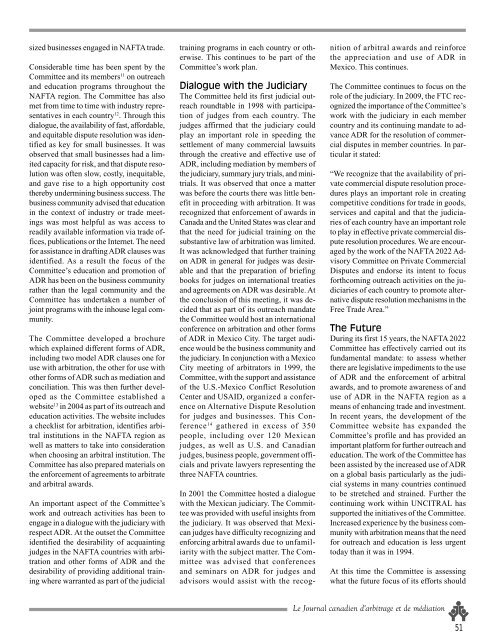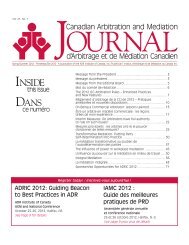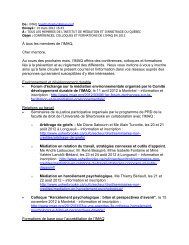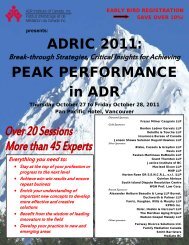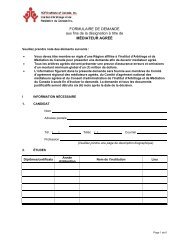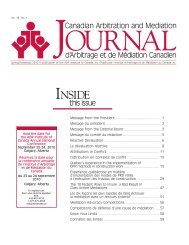Printemps 2011 - ADR Institute of Canada
Printemps 2011 - ADR Institute of Canada
Printemps 2011 - ADR Institute of Canada
You also want an ePaper? Increase the reach of your titles
YUMPU automatically turns print PDFs into web optimized ePapers that Google loves.
sized businesses engaged in NAFTA trade.Considerable time has been spent by theCommittee and its members 11 on outreachand education programs throughout theNAFTA region. The Committee has alsomet from time to time with industry representativesin each country 12 . Through thisdialogue, the availability <strong>of</strong> fast, affordable,and equitable dispute resolution was identifiedas key for small businesses. It wasobserved that small businesses had a limitedcapacity for risk, and that dispute resolutionwas <strong>of</strong>ten slow, costly, inequitable,and gave rise to a high opportunity costthereby undermining business success. Thebusiness community advised that educationin the context <strong>of</strong> industry or trade meetingswas most helpful as was access toreadily available information via trade <strong>of</strong>fices,publications or the Internet. The needfor assistance in drafting <strong>ADR</strong> clauses wasidentified. As a result the focus <strong>of</strong> theCommittee’s education and promotion <strong>of</strong><strong>ADR</strong> has been on the business communityrather than the legal community and theCommittee has undertaken a number <strong>of</strong>joint programs with the inhouse legal community.The Committee developed a brochurewhich explained different forms <strong>of</strong> <strong>ADR</strong>,including two model <strong>ADR</strong> clauses one foruse with arbitration, the other for use withother forms <strong>of</strong> <strong>ADR</strong> such as mediation andconciliation. This was then further developedas the Committee established awebsite 13 in 2004 as part <strong>of</strong> its outreach andeducation activities. The website includesa checklist for arbitration, identifies arbitralinstitutions in the NAFTA region aswell as matters to take into considerationwhen choosing an arbitral institution. TheCommittee has also prepared materials onthe enforcement <strong>of</strong> agreements to arbitrateand arbitral awards.An important aspect <strong>of</strong> the Committee’swork and outreach activities has been toengage in a dialogue with the judiciary withrespect <strong>ADR</strong>. At the outset the Committeeidentified the desirability <strong>of</strong> acquaintingjudges in the NAFTA countries with arbitrationand other forms <strong>of</strong> <strong>ADR</strong> and thedesirability <strong>of</strong> providing additional trainingwhere warranted as part <strong>of</strong> the judicialtraining programs in each country or otherwise.This continues to be part <strong>of</strong> theCommittee’s work plan.Dialogue with the JudiciaryThe Committee held its first judicial outreachroundtable in 1998 with participation<strong>of</strong> judges from each country. Thejudges affirmed that the judiciary couldplay an important role in speeding thesettlement <strong>of</strong> many commercial lawsuitsthrough the creative and effective use <strong>of</strong><strong>ADR</strong>, including mediation by members <strong>of</strong>the judiciary, summary jury trials, and minitrials.It was observed that once a matterwas before the courts there was little benefitin proceeding with arbitration. It wasrecognized that enforcement <strong>of</strong> awards in<strong>Canada</strong> and the United States was clear andthat the need for judicial training on thesubstantive law <strong>of</strong> arbitration was limited.It was acknowledged that further trainingon <strong>ADR</strong> in general for judges was desirableand that the preparation <strong>of</strong> briefingbooks for judges on international treatiesand agreements on <strong>ADR</strong> was desirable. Atthe conclusion <strong>of</strong> this meeting, it was decidedthat as part <strong>of</strong> its outreach mandatethe Committee would host an internationalconference on arbitration and other forms<strong>of</strong> <strong>ADR</strong> in Mexico City. The target audiencewould be the business community andthe judiciary. In conjunction with a MexicoCity meeting <strong>of</strong> arbitrators in 1999, theCommittee, with the support and assistance<strong>of</strong> the U.S.-Mexico Conflict ResolutionCenter and USAID, organized a conferenceon Alternative Dispute Resolutionfor judges and businesses. This Conference14 gathered in excess <strong>of</strong> 350people, including over 120 Mexicanjudges, as well as U.S. and Canadianjudges, business people, government <strong>of</strong>ficialsand private lawyers representing thethree NAFTA countries.In 2001 the Committee hosted a dialoguewith the Mexican judiciary. The Committeewas provided with useful insights fromthe judiciary. It was observed that Mexicanjudges have difficulty recognizing andenforcing arbitral awards due to unfamiliaritywith the subject matter. The Committeewas advised that conferencesand seminars on <strong>ADR</strong> for judges andadvisors would assist with the recognition<strong>of</strong> arbitral awards and reinforcethe appreciation and use <strong>of</strong> <strong>ADR</strong> inMexico. This continues.The Committee continues to focus on therole <strong>of</strong> the judiciary. In 2009, the FTC recognizedthe importance <strong>of</strong> the Committee’swork with the judiciary in each membercountry and its continuing mandate to advance<strong>ADR</strong> for the resolution <strong>of</strong> commercialdisputes in member countries. In particularit stated:“We recognize that the availability <strong>of</strong> privatecommercial dispute resolution proceduresplays an important role in creatingcompetitive conditions for trade in goods,services and capital and that the judiciaries<strong>of</strong> each country have an important roleto play in effective private commercial disputeresolution procedures. We are encouragedby the work <strong>of</strong> the NAFTA 2022 AdvisoryCommittee on Private CommercialDisputes and endorse its intent to focusforthcoming outreach activities on the judiciaries<strong>of</strong> each country to promote alternativedispute resolution mechanisms in theFree Trade Area.”The FutureDuring its first 15 years, the NAFTA 2022Committee has effectively carried out itsfundamental mandate: to assess whetherthere are legislative impediments to the use<strong>of</strong> <strong>ADR</strong> and the enforcement <strong>of</strong> arbitralawards, and to promote awareness <strong>of</strong> anduse <strong>of</strong> <strong>ADR</strong> in the NAFTA region as ameans <strong>of</strong> enhancing trade and investment.In recent years, the development <strong>of</strong> theCommittee website has expanded theCommittee’s pr<strong>of</strong>ile and has provided animportant platform for further outreach andeducation. The work <strong>of</strong> the Committee hasbeen assisted by the increased use <strong>of</strong> <strong>ADR</strong>on a global basis particularly as the judicialsystems in many countries continuedto be stretched and strained. Further thecontinuing work within UNCITRAL hassupported the initiatives <strong>of</strong> the Committee.Increased experience by the business communitywith arbitration means that the needfor outreach and education is less urgenttoday than it was in 1994.At this time the Committee is assessingwhat the future focus <strong>of</strong> its efforts shouldLe Journal canadien d'arbitrage et de médiation51


